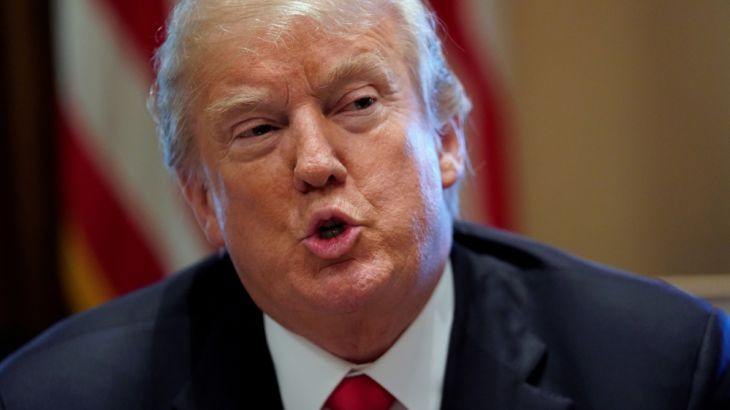Trump waives Iran nuclear sanctions ‘for last time’
US president says it’s the ‘last chance’ for US and Europe to come up with agreement to strengthen 2015 nuclear deal.

US President Donald Trump will continue sanctions relief for Iran, keeping the 2015 landmark nuclear deal in place for the time being.
The White House said on Friday that Trump will waive the sanctions against Iran for the “last time”, unless an agreement can be reached between the US and Europe within the next 120 days that would strengthen the nuclear deal.
Keep reading
list of 4 itemsSix takeaways from first day of Trump’s New York hush money criminal trial
Day 1 of Donald Trump’s first criminal trial
What is Donald Trump’s ‘hush money’ trial all about?
“Despite my strong inclination, I have not yet withdrawn the United States from the Iran nuclear deal,” Trump, who has repeatedly threatened to “rip up” the deal, said in a statement on Friday.
“Instead, I have outlined two possible paths forward: either fix the deal’s disastrous flaws, or the United States will withdraw,” he added.
“This is the last chance. In absence of such an agreement [between the US and European powers], the United States will not again waive sanctions in order to stay in the Iran nuclear deal.”
The announcement came as the US Treasury imposed sanctions on 14 Iranian individuals and companies, including the head of Iran’s judiciary, over alleged human rights abuses.
‘Desperate attempts to undermine agreement’
Iranian Foreign Minister Mohammad Javad Zarif called Trump’s decision an attempt to “undermine” the deal.
“Trump’s policy and today’s announcement amount to desperate attempts to undermine a solid multilateral agreement,” Zarif tweeted on Friday.
The nuclear deal “is not renegotiable: rather than repeating tired rhetoric, [the] US must bring itself into full compliance – just like Iran,” he added.
The 2015 Iran nuclear deal was struck between the US, under the administration of former President Barack Obama, Iran and five other countries. It prevents Iran from developing nuclear weapons while offering sanctions relief to allow the Islamic Republic to participate in international commerce and banking.
Under US law, the president is required to renew the waiver on sanctions every 120 days. The last time Trump issued a waiver was in September 2017.
In October of last year, Trump refused to recertify that Iran was in compliance with the agreement, saying it was “one of the worst and most one-sided transactions the US has ever entered into”.
That decision came despite the UN having certified Iran’s compliance with the deal eight times. In November, the body again said Iran was in compliance.
Ahmad Majidyar, the director of the Iran Observed Project, said he wasn’t surprised by Trump’s decision.
“No, I’m not surprised because this is the same stance that US President Trump took three months ago when he decertified the Iran nuclear deal,” Majidyar told Al Jazeera.
‘Four critical components’
On Friday, Trump outlined four “critical components” that must be included in US legislation regarding Iran.
“First, it must demand that Iran allow immediate inspections at all sites requested by international inspectors,” the US president said in a statement.
He also said that any legislation “must ensure that Iran never even comes close to possessing a nuclear weapon” and that “unlike the nuclear deal, these provisions must have no expiration date”. One reason Trump has criticised the nuclear deal is that certain aspects of the agreement expire after 10 or 15 years.
Finally, Trump said that any legislation “must explicitly state in the United States law – for the first time – that long-range missile and nuclear weapons programmes are inseparable, and that Iran’s development and testing of missiles should be subject to severe sanctions”.
There was no immediate reaction from Europe. According to AFP news agency, a spokeswoman for the German foreign ministry said that Berlin had “taken note” and would discuss the best course of action with its European allies.
Prior to making the announcement, Trump had faced pressure from European leaders who urged “all parties to continue to fully implement this agreement”.
Federica Mogherini, the European Union‘s foreign policy chief, said earlier this week that the “deal is working; it is delivering on its main goal, which means keeping the Iranian nuclear programme in check and under close surveillance”.
French President Emmanuel Macron called Trump on Thursday and reiterated that France wants “the strict application of the deal and the importance of all the signatories to respect it”.